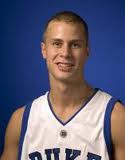 TEL AVIV, Israel — When All-American Jon Scheyer of Duke signed this year with Maccabi Tel-Aviv, many applauded the move as a great signing for Maccabi and a great opportunity for Scheyer to develop and advance his career. Last year, ESPN reporter Doug Gottlieb predicted, “Scheyer would be one of the more coveted players ever for a team like Maccabi Tel-Aviv.”
TEL AVIV, Israel — When All-American Jon Scheyer of Duke signed this year with Maccabi Tel-Aviv, many applauded the move as a great signing for Maccabi and a great opportunity for Scheyer to develop and advance his career. Last year, ESPN reporter Doug Gottlieb predicted, “Scheyer would be one of the more coveted players ever for a team like Maccabi Tel-Aviv.”
While only four foreign players are allowed to dress for each team in Israeli league play, Scheyer would not count as a foreign player due to his eligibility for Israeli citizenship. With Maccabi Tel-Aviv set to play in the Israeli League, the Adriatic League and the Euroleague, it was expected that Scheyer would be given ample playing time to hone his abilities against top level competition. After averaging only 1.3 points in 9.6 minutes after 10 “appearances” with Maccabi, including five Euroleague games in which he did not dress despite not being injured, Scheyer has proven to be another prime example of how badly American players can struggle when they go to the wrong situation overseas.
One of the biggest issues American players have when going abroad is a lack of understanding about the situations with many teams overseas. While Duke may be a team filled with McDonald’s All-Americans, and considered a powerhouse team in college, they are an elite amateur team. Maccabi Tel-Aviv is consistently one of the top teams in Euroleague, the highest level of basketball outside the NBA, and a league with a style that is drastically different from American basketball. Games are more defense-oriented, and teams rely heavily on veteran players with high basketball IQs far more than on young talents. Maccabi Tel-Aviv is filled with veteran players who have proven themselves to be among the top players overseas, typically playing 12 players every game, all of whom are expected to contribute.
With the exception of Tal Brody and David Bluthenthal, young players that have come to Maccabi Tel-Aviv prior to having pro success elsewhere have had a very difficult time playing for Maccabi and growing while they are there. Instead, it’s a team to join once you have proven yourself as a player, and are able to contribute to a team that will compete in the Euroleague. Without the salary cap restrictions of the NBA, Maccabi is able to fill its roster with all of the best players in Israel as well as some of the top players in Europe, making it very hard for young players to break into the rotation.
At the guard spot for Maccabi, Scheyer has to compete with a two-time NBA champion in Jordan Farmar, a two-time Euroleague champion and two-time Euroleague MVP in Theo Papaloukas from Greece, an eight-time Israeli league and three-time Euroleague champion in Tal Burstein, and one of Israel’s rising stars, Yogev Ohayon.
Ohayon, a 24-year-old guard, has been getting major minutes as a starter for Maccabi after proving himself with Hapoel Jerusalem and Galil Gilboa at both the Israeli league and Eurocup levels. While both of these teams may not have the budget or the fame of Maccabi, they are among the strongest teams in Israel and have competed in the Eurocup, the second division of the Euroleague. They both feature strong foreigners and talented Israelis, but they lack the star power of Maccabi, and an elite level prospect will be given a bit more growing room.
Lior Eliyahu, a Maccabi Tel-Aviv forward who was a second-round NBA draft pick in 2006, developed for several years in Galil Gilboa before making the move to Maccabi . After an injury-prone year in which he had a severe eye injury, Scheyer would have been better off going to a smaller team in Israel, where he would have been given more minutes and more opportunities without being stuck behind more proven players.
This isn’t to say that Scheyer’s career with Maccabi is absolutely headed for disaster. He proved during his time at Duke that he is an intelligent player who can take care of the basketball, knock down shots and play with a tremendous competitive spirit.
If Scheyer is able to continue working hard, despite not currently getting many opportunities, he may find some minutes throughout a long season in which Maccabi will play over 80 games in three leagues. However, if Scheyer is to succeed, he will need to be patient and understand that he will need to prove himself gradually in order to earn the trust of his coaches and teammates. Despite what many Americans may think, being a star player at Duke won’t guarantee success overseas.
AJ Mitnick is an American currently living in Israel and working for Maccabi Rishon Lezion of the Israeli Basketball Super League. A recent graduate of IDC Herzliya, Mitnick also maintains a basketball blog, http://mindlessdribble.net, and is pursuing a professional basketball coaching license from the Wingate Institute in Israel.
scheyer sucks and always has. he got stats against lesser teams in non-conf play and crappy ACC teams, and struggled for the most part in the tournament against topnotch defenders. not to mention the umpteen BS foul calls he got cause he’s a dookie.
if he can’t beat out jordan farmar (who is quite frankly, a mediocre NBA backup), then you can close the book on scheyer’s professional career.